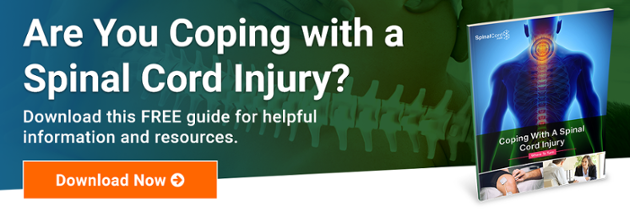Tips for Reaching Out to Other SCI Survivors
One of the best methods of coping with a spinal cord injury (SCI) is reaching out to the larger community and sharing your story with others who have been in your proverbial shoes. Talking to someone who understands what you’re going through, lets you benefit from their experience.
How can you approach someone else who has a spinal cord injury? What should you talk to other SCI survivors about?
Mason Ellis has a new video to help people who have recently suffered a spinal cord injury reach out to others, titled Coping with SCI: How to Talk to Other Survivors.
In the video, Mason talks about how confusing it can be to wake up in a hospital bed and not being able to move your body like you’re used to—as well as how he wishes that he had reached out to someone else who had been in a situation he was in sooner.
Some of the discussion topics that Mason suggests people who were recently injured talk about include:
- Arm and Leg Stretches. Getting in daily exercise is a key part of staying active and healthy after suffering an injury that causes paralysis. For one, stimulating your muscles helps prevent atrophy.
- Pressure Sores. Anyone who’s been confined to a chair for extended period of time can tell you about pressure sores—how they happen and how you can alleviate or prevent them.
- Bladder Management. While this topic might sound awkward to talk about with a stranger, it’s an important one. Having the insight of someone who has dealt with this issue for a long while can help make your own adjustments to post-paralysis bladder management easier.
- What Kind of Wheelchairs They Use. There are a surprising number of different wheelchairs available on the market. With so much variety, it can be hard to pick the one that’s right for you. Here’s where having an opinion from someone who’s had to spend a lot of time in a wheelchair can help.
- Type of Bed They Use. You may find that your sleep and comfort needs have changed after a spinal injury. Talking to another SCI survivor about what kind of beds they use (whether regular beds or hospital beds) could be useful on your own hunt for the perfect bed to sleep in. They’ll know the ins and outs of transferring from the bed to the wheelchair (and vice versa), getting the right support, and more.
- Recreational Activities/Sports. Many newly-injured people don’t realize just how many different sports and recreation activities they can do from the confines of a wheelchair. However, someone with a bit more experience can often easily point you to an activity that you might like.
Taking the time to talk to another person about your spinal cord injury can make a huge difference for your recovery and rehabilitation—whether you do it in person or online via Facebook or something similar.
You can get the full list of what to talk to other SCI survivors about in Mason’s video, or join the Spinalcord.com community right now!
Stay Updated on Advancements On Traumatic Brain &
Spinal Cord Injuries
About the Author
Mason Ellis
Mason Ellis shares videos and articles with the Spinal Cord Injury Community based on his experiences living as a complete C5, C6, C7 quadriplegic survivor. Mason was injured on January 19, 2015 in an automobile accident which also caused a traumatic brain injury. Since recovering, his goal has been to help other survivors with his videos and raise awareness among the able-bodied population.
To view Mason’s entire library of videos you can visit his personal YouTube Page here. You can also connect with him on Instagram.





